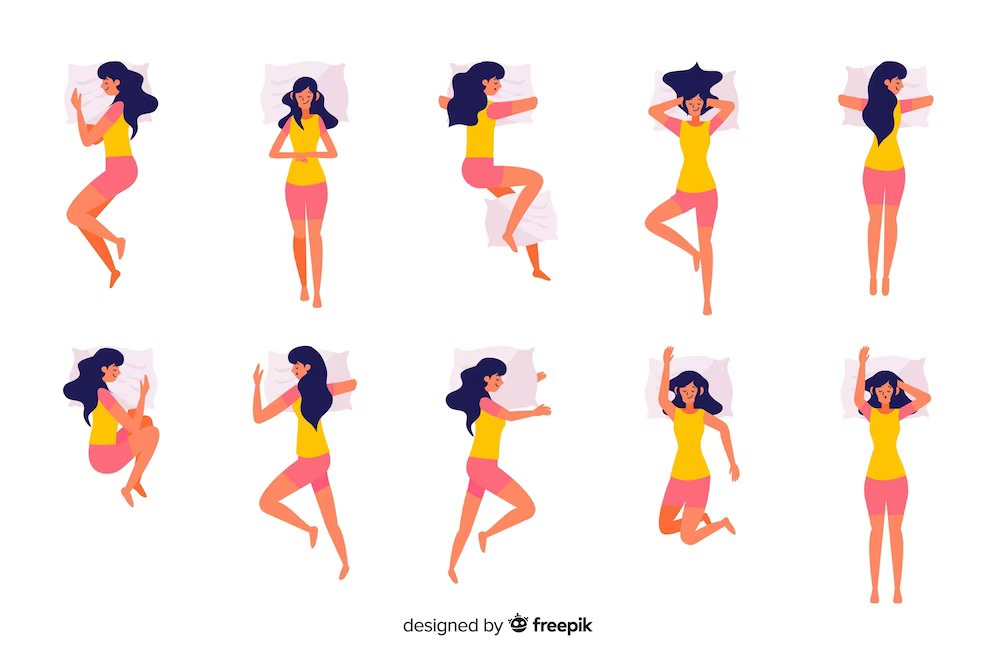The sleep positions we choose can affect various health conditions, exacerbate, or alleviate pain, and significantly impact sleep quality. It affects our lives in several ways and has profound effects on our physical and mental health.In short? Your preferred sleep position is essential. And whether you are a back, side, or stomach sleeper, there are a few things you can do to optimize your sleep.
But that is not all. Choosing a good sleeping position is useless if the mattress you sleep on does not support you throughout the night. Yes, it is true. Different sleepers require different types of mattresses.
How do sleep positions affect your back?
When you think about poor posture contributing to orthopedic illnesses like lower back pain or neck discomfort, standing posture or sitting position typically come to mind. Your preferred sleep position is the third type of posture, and it is just as crucial to your health as standing and sitting, even if you're not conscious of it.
Your spinal column and other body parts may suffer as a result of your body's sleep positions.
The position we adopt while sleeping is maintained for several hours at a time, except for a few tosses and turns during the night. Something in the body that is twisted, crooked, or held at an odd angle might stay that way for a very long time compared to when you are awake.
As you are probably aware by now, an improper sleeping posture can cause pain in different body parts the next day including your spine, which includes your neck and back, the importance of the sleep positions cannot be undermined.
Depending on how you sleep, your body will press against the mattress differently. This creates different pressure points with different types of sleep. Therefore, the best mattress for you is comfortable and does not cause sore acupuncture points.
For a good night's sleep, pay attention to the following points when choosing a mattress.
- What is the material?
A mattress with a comfort layer softens the body. For example, a memory foam mattress.
- How hard is the mattress?
Firmness is largely a personal choice, but choosing the right firmness based on your sleep position type can help you sleep better. Choose one that is neither too soft to sink in nor too hard to make you uncomfortable.Let's take a closer look at the dominant sleep positions, understand their pros and cons, and choose the best mattress.
- Back sleepers
Sleeping on your back is considered the best sleeping position for the right alignment of your spine. But that does not mean that everyone should sleep on their back. Back sleeping has the following advantages:
Sleeping on your back promotes a neutral alignment of your spine. Maintaining a proper posture during sleep allows you to breathe at your maximum capacity and minimizes the chance of developing pain
As long as you sleep on a supportive mattress, sleeping on your back will raise your hips and align them with your spine. This reduces pressure on the spine and supports healthy posture.
Also, sleeping on your back reduces wrinkles on your face.
However, people with acid reflux or GERD, snoring problems, and pregnant women should avoid sleeping on their backs. If you have difficulty breathing when you sleep, you should avoid lying on your back. In this position, your tongue blocks your airways while you are sleeping.
The ideal mattress for back sleepers
If you are a back sleeper, you should prefer a medium-firm bed. Because it relieves pressure while supporting the spine. A mattress that is too soft may not provide enough support to keep your lower back and spine aligned, and a mattress that is too firm can create pressure points around your shoulders and hips.
Ideally, back sleepers should use memory foam or hybrid mattresses. It all depends on your comfort.
In addition, the orthopedic mattress supports the spine and reduces back pain. For example, the Livpure mattress with orthopedic support - the OrthoX memory foam mattress - fits your back and ensures a restful night's sleep.
- Side sleepers
Sleeping on your side is one of the most popular sleep positions. It is not as beneficial as sleeping on the back. There are several reasons to adopt this position.
- Side sleeping has the following advantages.
- Side sleeping is a safe position for pregnant women. This type of sleeping position is preferred by pregnant women because it promotes healthy blood flow, optimal nerve function, and perfect spinal alignment. Pregnant women sleeping on their backs are advised to switch to their side as this increases the amount of oxygen that the fetus receives.
- Side sleeping could reduce lower back pain.
- Side sleeping can reduce symptoms of acid reflux and GERD. Sleeping on the left side is particularly beneficial in case you have heartburn.
- Side sleeping can reduce problems related to snoring and sleep apnea. Sleeping on your side keeps your airway open, minimizes snoring, and relieves sleep apnea.
However, people with shoulder pain and heart conditions should not sleep on their side.
Ideal Mattress for side sleepers
Sleeping on your side puts strain on your neck, shoulders, and lower back, so your mattress needs to accommodate that pressure. For this reason, side sleepers generally need a mattress with a "give" to their hips and shoulders. This reduces pain in these areas and helps keep your spine aligned.
The memory foam mattress will provide excellent support for sharp curves from sleeping on the side.
- Stomach
Sleeping on the stomach generally reduces with your age. As you grow older, you become less mobile. Also, you need additional effort to breathe when you grow older so it becomes difficult to sleep on your stomach.
Usually, experts advise against sleeping on your stomach. This posture is detrimental to your spine health.
Your back often hurts when you sleep on your stomach. This is because it's difficult to keep your hips in line with your spine all night long. So it may cause spinal alignment issues.
Even though it may seem like a comfortable posture, it might hurt your back or neck.
The good side of stomach sleeping is that it reduces snoring!
Ideal Mattress for stomach sleepers
Find a slightly firmer mattress. A firmer mattress will provide more support for your spine to prevent your hips from sinking too far into the bed and shifting your spine. In general, stomach sleepers need more supportive mattresses than back or side sleepers.
A foam or memory foam mattress will suffice in most cases. Provides a balance of comfort and support.
About Livpure
Your preferred sleep position is more important than you think. Your sleep at night depends on your posture, whether you are on your back, side, or prone. Each position has strengths and weaknesses. Your mattress is equally important for quality sleep. So, you need to choose the right mattress for yourself from Livpure.
Also Read: Do Side Sleepers Need A Softer Mattress




